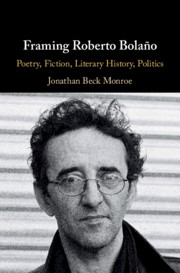Introduction - Unpacking Bolaño’s Library
Published online by Cambridge University Press: 09 September 2019
Summary
From what he called his first “novel,” Antwerp–a numbered sequence of fifty-six discrete, titled prose poems, more disjunctive and modular than narrative and linear–through the posthumously published 2666 and Woes of the True Policeman, Bolaño explores more pervasively than any other concern over the course of his career what we may call narratives of poetic and novelistic apprenticeship. As such prose-poetic, literary-historical interventions as his “A Stroll through Literature” and “Literature + Illness = Illness” attest, he consistently inquires into the choices aspiring young writers face as they are drawn into what Franco Moretti has called the “slaughterhouse,” what Bolaño himself called the “minefield,” of poetry, of fiction, of literature. To the extent that poetry pursues self-isolating strategies, approaches that constrain and contain it in misguided attempts to protect a certain “poetic,” or “lyric,” identity, his work suggests, poetry risks finding itself increasingly marginalized in relation to the novel’s more inclusive dialogical, heterglossic capacities. Poetry’s greatest hope, what Bolaño calls its particular “non-power” (“no-poder”), thus continues to lie paradoxically in its increasing openness to other discourses, its ability to embrace a certain non-identity, the politics of genre opening onto the political in the broadest, most inclusive sense.
Keywords
- Type
- Chapter
- Information
- Framing Roberto BolañoPoetry, Fiction, Literary History, Politics, pp. 1 - 20Publisher: Cambridge University PressPrint publication year: 2019



